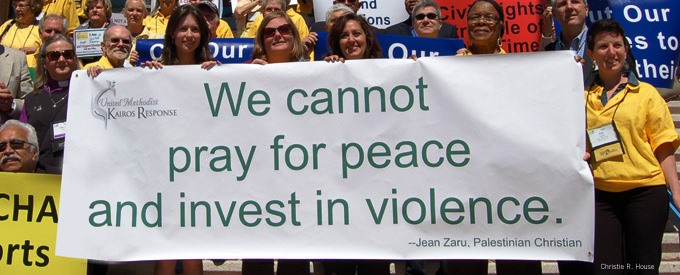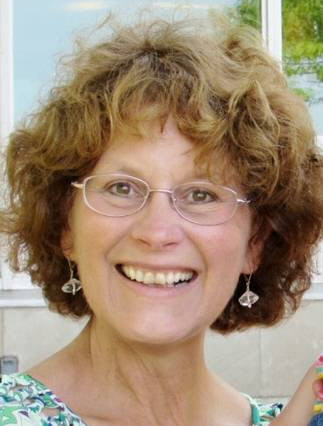Moment of truth. Confession of faith. Call to action.
These phrases sound familiar to those of us compelled and called by Kairos Palestine, the 2009 initiative that brings “a word of faith, hope and love” from the besieged Christian community of Palestine.
In the years since 2009, Kairos Palestine has become a global movement. Churches have brought its message and words into their worship, study and mission. The call to confession has been heard. The word of truth has been acknowledged. The impetus to action has borne fruit. Kairos USA is a proud part of this movement.
Yet the people of Palestine do not yet have their freedom back. There is much more left to do. And among several prominent denominations, there is indeed significant actions on stage in the months ahead.
This summer, four American denominations will use portions of their national gatherings to deliberate within the scope and purview of the Kairos Palestine document. The United Church of Christ is meeting in Cleveland, the Episcopal Church in Salt Lake City, and the Mennonite Church USA in Kansas City. Each will consider resolutions that propose boycott, divestment, and/or sanction guidelines. The study of Kairos Palestine across the churches is also being promoted. The Unitarian Universalist General Assembly, convening in Portland, OR, will feature a program titled “Creating New Ways of Reflection and Learning about Israel/Palestine,” with Kairos USA Executive Director Mark Braverman as one of the presenters.
 These momentous convocations demonstrate that the movement to activate American churches for powerful advocacy is coming of age. Long efforts are bearing fruit. Some denominations have already divested from companies that sustain the military occupation, while others have adopted a policy of boycotting products grown or manufactured within illegal colonial settlements inside the West Bank. Study and travel opportunities are proliferating to provide fresh perspective and a new consideration of Palestinian experience under the Israeli military occupation. Political advocacy is coming into its own as strategic actions are identified and expanding networks of activists are utilized.
These momentous convocations demonstrate that the movement to activate American churches for powerful advocacy is coming of age. Long efforts are bearing fruit. Some denominations have already divested from companies that sustain the military occupation, while others have adopted a policy of boycotting products grown or manufactured within illegal colonial settlements inside the West Bank. Study and travel opportunities are proliferating to provide fresh perspective and a new consideration of Palestinian experience under the Israeli military occupation. Political advocacy is coming into its own as strategic actions are identified and expanding networks of activists are utilized.
What equips the American Church for principled action on behalf of Palestinian freedom? We are well-situated to study, discern and take action. Here are a few of our assets:
- We have a practice of gathering weekly, a tradition of collaboration, a teaching/learning culture. Networks for action are strong and growing stronger. We know each other!
- The prophetic voice of the African American church and our increasingly diverse church populations bode well for “connecting the dots” between U.S. challenges and Palestinian realities. Black lives matter. So do Palestinian lives. Both suffer under militarized policing and systematic racism.
- Our Christian liturgical year with its emphasis on the life and work of Jesus opens opportunities to consider present-day realities in Biblical locations. We are motivated to “go and see” the land of Jesus’ birth.
- The Christian and Muslim communities of Palestine are ready and eager to welcome us with their renowned hospitality. The high value placed on education in Palestine has produced brilliant Palestinian community leaders with whom to collaborate.
- Within the ecumenical and interfaith movement we have a positive, successful record of divestment and boycott efforts: the bus boycott of Montgomery, the divestment movement against apartheid South Africa, American farm worker grape boycott and Nestle infant formula boycott are just a few examples.
- Our movement in support of Palestine is interfaith, ecumenical, and inclusive. Our efforts find support and assistance from Jews and Muslims. We work gratefully with secular groups committed to the justice agenda.
- New theological voices from the evangelical church bring fresh Biblical power to our movement in support of justice for Palestine.
- A strong history of mission efforts within Palestine provides accomplished Palestinian partners and gifted mission personnel who keep us informed about facts on the ground.
Of course, we also have challenges.
- The theology of Christian Zionism continues to challenge our efforts. The bleak demand of the “ecumenical deal” (We won’t shame you about the Holocaust if you will simply remain silent about the Occupation) too often keeps us silent. The fear of ruptured relationships with Jewish neighbors, friends and colleagues sometimes paralyzes us.
- Our very success elicits increased opposition. Campuses, the U.S. Congress and Zionist community groups harm us with false accusations of anti-Semitism. They sometimes attempt to restrict our free speech and free association.
- Denominational learning curves and commitment to action are still far from complete. Our churches face intense debate when we push for a clear moral voice and public commitment to justice in Palestine. We are sometimes considered trouble-makers!
As we enter this historic time of action, let me leave you with this prayer.
O God, bless the trouble makers of Summer 2015! In Cleveland, Portland, Salt Lake City and Kansas City may they feel the power of our shared commitments. Send your Spirit to expand the bonds of friendship and collaboration among us. Equip us to speak boldly and act faithfully in support of renewed freedom and true equality for Palestine Israel.














Dee Poujade says
Well said, Diane! We need to keep praying for all of those denominations you mentioned – and for peace for all people!